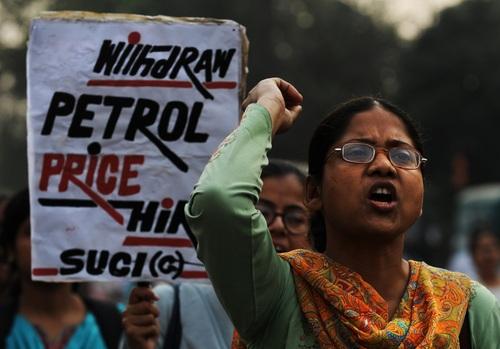India: Partial rollback of petrol price hike on the horizon?
Deja vu? Activists of Socialist Unity Center of India (Communist) shouts slogans during a rally organised in protest against the recent national petrol price increase in Kolkata on November 4, 2011. Look for similar scenes on May 31, as India’s opposition parties have called for a nationwide general strike to protest Manmohan Singh’s move to hike petrol prices to rein in the plunging rupee.
What will be the fallout from Manmohan Singh's bold move to hike petrol prices and rein in the rupee?
The plummeting Indian currency continued to trade lower early Friday, after an apparent intervention by the central bank arrested its fall Thursday.
But even as economists argue that a comparable hike in diesel and kerosene prices is needed to end the slide, stiff opposition from Singh's coalition partners and the opposition — as well as street protests across the country — have further hampered the prime minister's ability to take action.
Instead of an increase in diesel and kerosene prices — which is riskier than hiking petrol prices, because the diesel price has a more direct effect on inflation and kerosene is the fuel of the poor — we may well see a partial rollback of the increase in petrol prices, reports CNN/IBN.
"Sources say that while the Congress wants the rollback [of the Rs 7.5 hike] to be in the range of Rs 3-5, the government is likely to go ahead with a cut of around Rs 2-2.50 per liter," the news channel said.
One reason may be that the Congress-led United Progressive Alliance (UPA) government is unstable, despite Congress Party President Sonia Gandhi's attempt to woo the Samajwadi Party's Mulayam Singh Yadav, the Hindustan Times reports. "Don't read too much into Mulayam presence at dinner," a headline reads.
"The talk that [Yadav] was going to bail out the UPA if Mamata Banerjee’s Trinamool Congress pulls out [of the coalition] is illogical," the paper writes. "Even Mamata will want to be a major player at the Centre and increase her tally from 18 to over 30. Jayalalithaa will certainly be tempted as well to marginalise the DMK further in Tamil Nadu. All of them, in other words, may benefit if early elections take place. The regional players will need each other so one of them can get elevated as PM when the next election takes place."
Meanwhile, the actual opposition — the Bharatiya Janata Party and the Left — plans a nationwide general strike to protest the price hike on May 31.
What are Singh's options? He doesn't have too many. But some rash optimists are suggesting that he may pull a rabbit out of his turban and re-introduce measures to open up the retail sector to foreign investment from megastores like Walmart. (Don't be fooled: We have been writing about FDI in retail for "donkey's years," as the Indians say, and it has yet to materialize).
It's no surprise that CLSA's Rajeev Malik tells the New York Times that the Indian economy could get worse before things get better.
The story you just read is accessible and free to all because thousands of listeners and readers contribute to our nonprofit newsroom. We go deep to bring you the human-centered international reporting that you know you can trust. To do this work and to do it well, we rely on the support of our listeners. If you appreciated our coverage this year, if there was a story that made you pause or a song that moved you, would you consider making a gift to sustain our work through 2024 and beyond?
